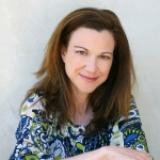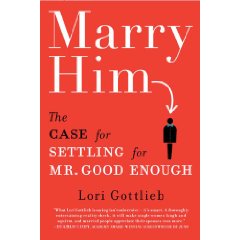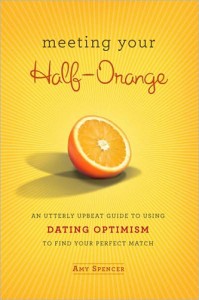Good (enough) lovin’: Q&A with embattled author Lori Gottlieb
 Lori Gottlieb’s Marry Him: The Case for Settling for Mr. Good Enough
Lori Gottlieb’s Marry Him: The Case for Settling for Mr. Good Enough–which started life as an article that got a whole lot more people to read The Atlantic–has been getting heated attention since its publication in early February. The book has garnered high praise from many relationship experts, book critics, and readers, and also — shall we say — spirited dismissals from nay-sayers who question Gottlieb’s facts, premise, or even her emphasis on marriage.
Gottlieb’s thesis: a woman, particularly an older woman (and by “older” we mean not 27), who allows pickiness and a sense of entitlement to restrict her dating life is missing an opportunity to find her “Mr. Good Enough.†It has, understandably, rankled some who take issue with the idea of “settling” — shifting definitions though it may have — or those who wonder if women, in fact, aren’t picky enough.
An animated, friendly lady with a good sense of humor about it all, Gottlieb is well-prepared to counter criticism from people who have read no more than her book’s title and thus feel qualified to reject it.
 I have to admit, the subtitle of your book (The Case For Settling For Mr. Good Enough) is a little hard to digest, and I wonder if it doesn’t subvert what is basically a helpful and positive message about having more realistic expectations. Was this your choice of words, or your publisher’s?
I have to admit, the subtitle of your book (The Case For Settling For Mr. Good Enough) is a little hard to digest, and I wonder if it doesn’t subvert what is basically a helpful and positive message about having more realistic expectations. Was this your choice of words, or your publisher’s?
Well, this came from the original subtitle of the Atlantic article, but it’s used to really get people to think about what “settling” actually means. Forgive the pun, but some people are unsettled by the idea of “settling.†But the thing is, I’m not telling women that they have to set low standards, or put up with relationships that don’t work. I’m suggesting they revise the list of things they’re looking for in a man — to conform with what actually makes a strong relationship and actually makes people happy in love.
There’s a presupposition here that marriage is a good thing for people–
Nope, no presupposition there at all. I’m saying that marriage is something I want personally, and I’m not alone in wanting it. So I was trying to figure out what was keeping me from finding the right guy. If you aren’t interested in marriage, there’s no reason to read a book about how to be happy in a marriage. This book isn’t for people who are happy to go through life single. It’s for people who want to find long-term romantic happiness and are curious about how to do that.
Your book is unusual in that it’s not truly a self-help book, although it does give advice to readers. Maybe it’s more like a memoir of a certain period of you life, with some breaks in the fourth wall…
It’s not self-help or a memoir, really–this is journalism. I’m a journalist by profession, and I did a lot of research to explore the question: what really matters in love? I interviewed neurobiologists to talk about chemistry, sociologists to talk about how the culture influences us, scientists and researchers who study relationships and marriage, men and women who were out there dating and who were married. The goal was to get some answers for myself and others struggling with these questions.
You emphasize the importance of distinguishing between “needs†and mere “wants†when looking for a life partner, and how learning to separate the two led you to a successful online match with the man you dub “Sheldon2.†I know you were only seeing him for a few months, but it sounds like the experience provided an important insight for you anyway.
Actually, I’m still in touch with “Sheldon2.” We’ve stayed in touch, and talk regularly, but yes, definitely: that was a lesson in not letting superficial criteria get in the way of more important qualities. I mean, I saw his bowtie in the [online dating profile] photo, and thought “Ugh! I don’t wanna date Orville Redenbacher!†but then it turns out the bowtie was from his grandfather, and was a way of honoring his connection with him. And his profession, which was listed as “real estate‗well, he had studied architecture, really loved his work, but I wrongly assumed he wouldn’t be creative enough. And Sheldon2 is 5’ 6‗I’m 5’1 ½ —and I just never thought I’d be attracted to a guy who was 5’6â€. And I was so wrong, again! I was very attracted to him. But I learned that I had to get past that stuff, the stuff I always thought was important but had nothing to do whether he might make me happy
Were you able to process that lesson in your dating behavior after that?
Oh, yeah, and I have to say, my inbox is full of emails from men who’ve read the article or read the book and like what I have to say. Cuz I’m basically saying, let’s stop judging men on these superficial criteria, and value them for what they bring to a relationship–and they appreciate that.
Early in the book you pose the question “how much compromise [in a relationship] is too much?†and the question doesn’t explicitly get answered. I’m curious if you were able to answer that question at least for yourself.
Sure, that’s something that people have to address for themselves, and I think, again, it goes back to valuing what is going to make you happy in the long term, not what might look good on paper or what you assume will make you happy but so far hasn’t.
Your book is clearly written from a female heterosexual perspective, but have you gotten any feedback from the gay community?
Yes, the response has been very positive–it’s a universal theme. Hey, everyone wants to find their Mr.–or Ms.–Good Enough!







 Amy Spencer’s
Amy Spencer’s 
